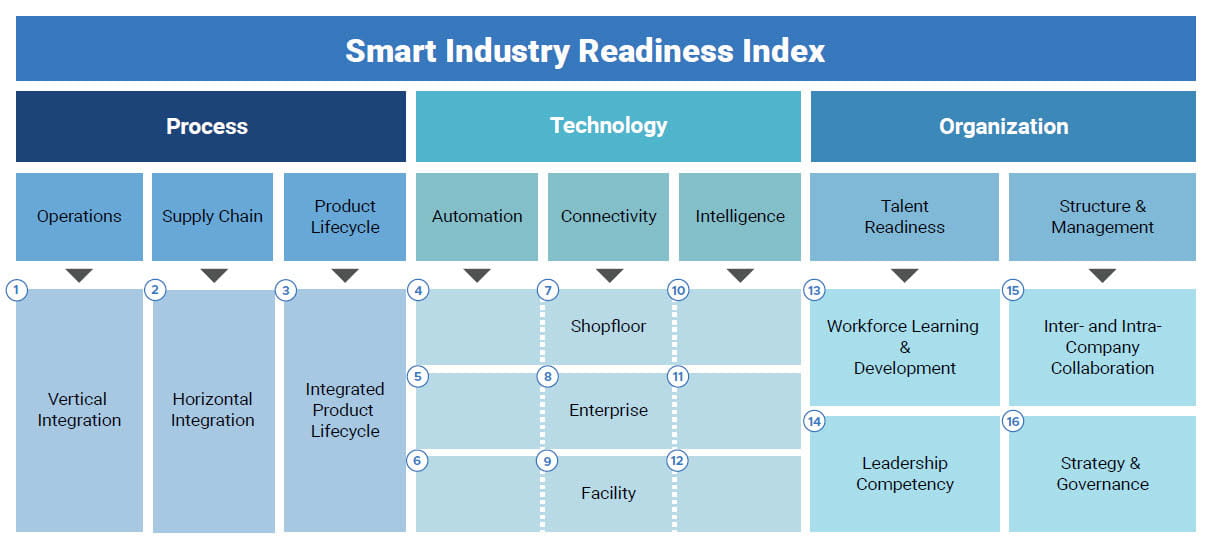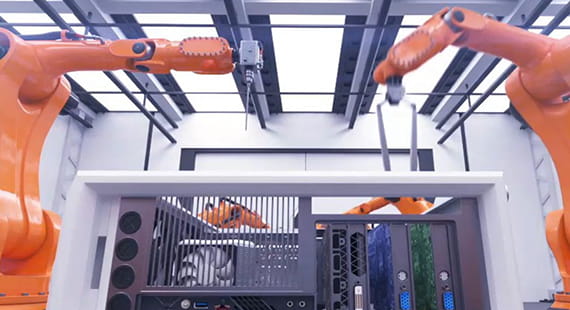
Big strides into the fourth industrial revolution
Big strides into the fourth industrial revolution
"Companies globally struggle to understand what Industrie 4.0 means for them. The Smart Industry Readiness Index breaks down concepts into key building blocks, and provides a clear articulation of the tangible benefits to companies."
Dr. Andreas Hauser
Director of Digital Service, TÜV SÜD
Thursday, October 15, 2020
Singapore’s Smart Nation ambitions are in full swing. Well-developed digital infrastructure and supportive government policies has made it a welcoming place for companies to setup operations and take flight their digital initiatives. In 2016, Singapore topped the Economist Intelligence Unit’s Asian Digital Transformation Index.
From smart home solutions, to the introduction of autonomous vehicles, to assistive and robotics technology in healthcare, Singapore continues to invest in research and development to build up its technological offerings and drive economic growth.
An industry that has an important role in this growth is manufacturing, which accounts for 20% to 25% of Singapore’s GDP. Countries like Germany and China have paved the way for smart manufacturing through their national initiatives Industrie 4.0 and Made in China 2025, and Singapore is following suit.
However, companies globally have struggled to understand what Industrie 4.0 truly means for them.
“Many manufacturers have provided feedback that Industrie 4.0 is often talked about in broad, all-encompassing terms in literature,” says Dr. Andreas Hauser, Director of Digital Service, TÜV SÜD. Industrie 4.0-related jargon and buzzwords have also been bandied about making it difficult for all businesses to understand what the offerings of Industrie 4.0 are. “There is a need to establish a common understanding of Industrie 4.0 by breaking down its concepts into digestible, key building blocks, and provide a clear articulation of the tangible benefits to companies,” says Dr. Hauser.
And this is where Singapore can do things differently. Enter: The Smart Industry Readiness Index (”SIRI”).
In November 2017, the Singapore Economic Development Board (EDB) in partnership with TÜV SÜD launched the Smart Industry Readiness Index (SIRI) to help companies evaluate existing manufacturing facilities, support companies in their transformation journey and drive the industry-wide revolution.
“SIRI is a world-first Industrie 4.0 tool used to drive both enterprise and nation-wide transformation of industrial sectors,” says Dr. Hauser. Its framework guides companies across the entire Industrie 4.0 lifecycle and has been built to offer a holistic and step-by-step guide to transforming business. “SIRI strikes a balance between technical rigour and usability and has been piloted with both Small and Medium-sized Enterprises (SMEs) and Multi National Corporations (MNCs) across industries in Singapore,” says Dr. Hauser.
It was created after a thorough literature review of a wide range of Industrie 4.0-related concepts and frameworks. These included industry reports, landscape studies, business surveys, and models produced by leading associations and industry players.

Singapore with its global trade and network would not be able stand alone in its efforts. So in spite of SIRI being a Singapore-first initiative, Dr. Hauser assures that it has been “fully aligned with global manufacturing standards, such as Germany’s RAMI 4.0 framework.”
What this also means is that SIRI is not confined to certain types of businesses only. Jackie Tan, Senior Advisor for Advanced Manufacturing, Digital Service in TÜV SÜD concurs, “It is scalable worldwide due to a global language being used,” says Mr. Tan, “And the project scope of each evaluation is also defined with the company, enabling SIRI to be applied to different types of industries and company size.”
SIRI Assessment was piloted with 16 companies – MNCs and SMEs – from discrete manufacturing to process industry including Aerospace, Petrochemical, Pharmaceutical and Food & Beverage. The individual companies face very different challenges stemming from operations, supply chain, management or organisation.
“One of the challenges in global organisations is the different levels of familiarity of Industrie 4.0 concepts across the various technology and operations teams,” explains Mr. Tan. “When we held the workshop, the participants expressed that SIRI is informative in explaining the key Industrie 4.0 concepts, principles, and benefits. They also conveyed that SIRI and assessment workshops helped the team to gain a common, company-specific understanding of Industrie 4.0 and to consider all relevant aspects leading to a structured and concerted approach of their transformation roadmap.”
“While some companies may focus on increasing the production volume, others want to devise a general, actionable digital transformation strategy. During one of the assessments with TÜV SÜD, participants communicated their general challenge of adopting new technologies,” says Mr. Tan. “They stated that due to the plant being capital intensive and the need to follow stringent safety regulations, technology adoption is slower, and they often face lack of integration with legacy systems.”
After the assessment workshops, the participants shared that with the newly gained understanding of the concept, benefits of Industrie 4.0, and particularly its company-specific interpretation through SIRI, the transformation roadmap could be developed in a structured and targeted way. In particular, the comprehensive approach of SIRI with its three building blocks – Process, Technology and Organisation – and 16 assessment dimensions helped the company to include all relevant areas.
SIRI Assessment can also be applied to SMEs. One such example is a food manufacturer based in Singapore, Thong Siek Food Industry, that distributes their seafood products globally, mentioned that the assessment has helped them to better visualise their transformation plans in a holistic approach and forms the basis to drive alignment towards a common understanding and vision. The video below showcases an overview of SIRI as well as an interview with Thong Siek.
Singapore will continue to accelerate industrial transformation and has implemented more than 300 SIRI Assessments for Singapore companies with the Smart Industry Readiness Index to help them adopt advanced manufacturing.
SIRI will go beyond Singapore’s shores. It is currently being shared globally through trade missions across ASEAN and Europe, with plans to introduce SIRI globally. “At trade missions, we speak to government officials, manufacturers, technical providers and system integrators to showcase that TÜV SÜD is the right partner and has the competency for Industrie 4.0,” says Dr. Hauser. “The objective is to overcome challenges that manufacturers face globally, and eventually implement the Index for them.”
With SIRI framework in place, the future of smart manufacturing and Industrie 4.0 will seem less like a distant vision and more like an imminent reality.
Contact our expert today to start your transformation journey. For more information about implementing Smart Industry Readiness Index (SIRI) for your organisation, please refer to link here.

Site Selector
Global
Americas
Asia
Europe
Middle East and Africa